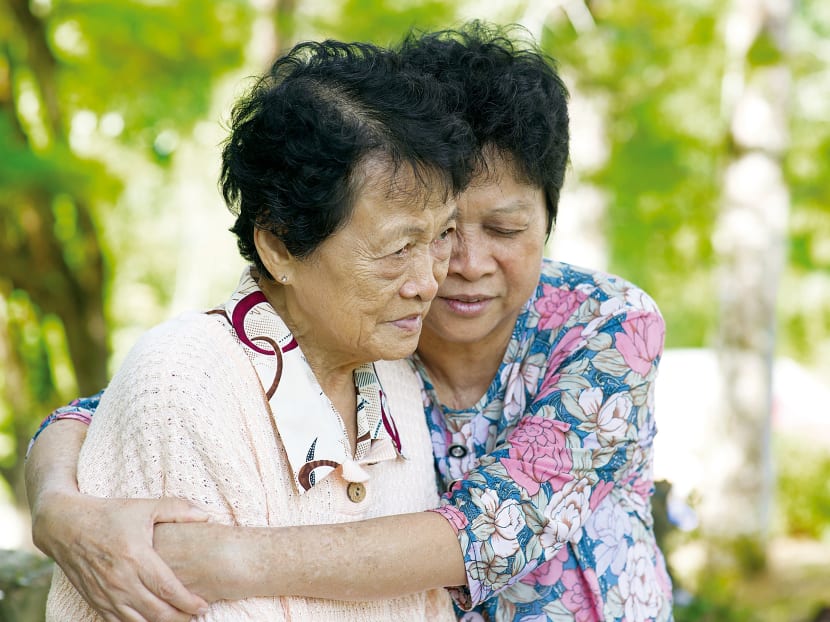Recognising anxiety disorders in seniors
SINGAPORE — Complaining of heart palpitations and pain, a 76-year-old diabetic woman checked herself into the same restructured hospital three times within a year. The doctors could not find anything wrong with her heart after running a series of medical tests.

Understanding and support are vital when it comes to handling older family members who have anxiety disorders. PHOTO: THINKSTOCK
SINGAPORE — Complaining of heart palpitations and pain, a 76-year-old diabetic woman checked herself into the same restructured hospital three times within a year. The doctors could not find anything wrong with her heart after running a series of medical tests.
Undeterred, she insisted on seeing a private cardiologist, who also gave her a clean bill of health.
The woman’s daughter, who is in her 50s, said her siblings initially felt that she was simply seeking attention.
“My mum was easily agitated, had no appetite and complained non-stop about heart spasms. The strange thing was she immediately felt better when she was in the hospital. We thought it was all in her mind,” she said.
After a long, wild-goose chase, the elderly woman was referred to a psychiatrist and found to be suffering from anxiety and mild depression.
DIFFERENT SYMPTOMS
SEEN IN THE ELDERLY
The elderly who suffer from anxiety disorders and depression usually do not display classic symptoms found in younger patients, said United States-based Professor Bob Knight from Davis School of Gerontology, University of Southern California.
“Older adults tend to be less obviously sad or display psychological distress. Rather, they may complain about fatigue, pain or sleep problems,” shared Prof Knight, who spoke on the topic at the Tsao Foundation Experts Series 2014: Ageing and Anxiety conference last month.
Anxiety disorder symptoms may also overlap with those of pre-existing medical conditions. “For instance, since many symptoms of panic disorder (a type of anxiety disorder) mimic those of heart disease and other serious illnesses, people with the disorder often make many visits to emergency rooms or the doctor’s office, convinced they have a life-threatening issue,” said Prof Knight.
This phenomenon is especially common in the Asian context, where older adults may not be comfortable expressing their emotions, said Ms Wang Jing, senior counsellor of counselling and coaching at Hua Mei Centre for Successful Ageing (HMCSA). The negative feelings could then translate into physical symptoms and complaints.
LATE-LIFE ANXIETY DISORDERS UNDER-RECOGNISED
Prof Knight believes that is why late-life anxiety disorders, which afflict up to 5 per cent of seniors worldwide, might be under-recognised.
An initiative by Tsao Foundation, HMCSA sees about 200 cases for counselling each year. About one in five of its elderly clients has psychological issues, said Ms Wang.
Some of the more commonly seen anxiety disorders among this group of elderly include generalised anxiety disorders (GAD) and obsessive compulsive disorders (OCD), she said.
GAD sufferers generally experience excessive, out-of-control anxiety, while people with OCD, which is also a type of anxiety disorder, may be obsessed with compulsive rituals or thoughts that can cause great anxiety. Both forms of anxiety disorders can take a toll on everyday life and relationships.
“Without treatment, the symptoms tend to worsen over time and may even complicate recovery for other illnesses,” said Prof Knight.
HIGHER RISK OF
ANXIETY DISORDERS
Prof Knight said older adults are at risk of anxiety disorders due to factors that may crop up later in life, such as a chronic illness, disability, bereavement or caregiver stress. The good news is, with early detection and treatment, it is possible to address anxiety issues effectively.
“Ideally, the primary care physicians should recognise and make referrals for the elderly person to seek help. Medication, at least in the short term, can be an important part of the treatment process, as can psychological interventions,” said Prof Knight.
Family support is just as important, said Ms Wang.
“The important message for family members and caregivers is that the older person is not purposely trying to make life difficult for you. They need help to address the underlying issues and having open discussions can help.”
Initially resistant to getting psychiatric help, the elderly woman was eventually persuaded to receive treatment.





